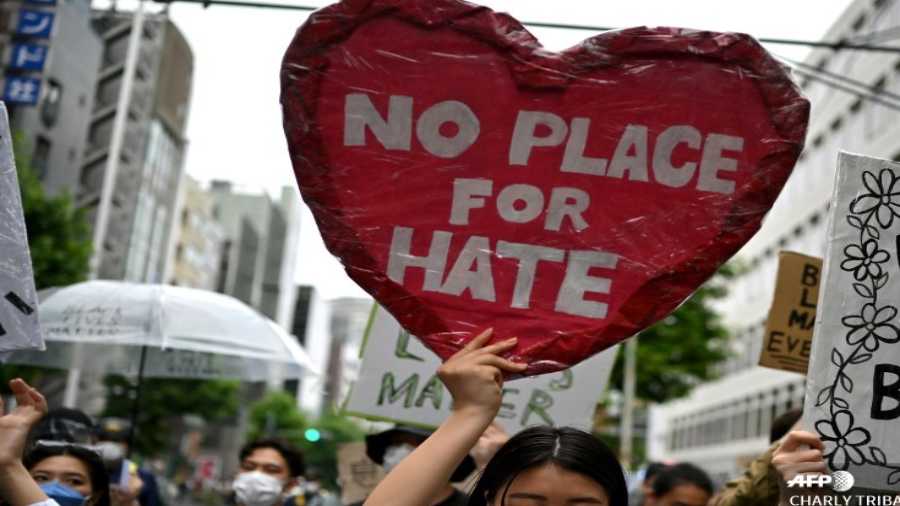Let no one have to repeat the tragic words like George Perry Floyd, Jr: 'I can't breathe,' the Delhi High Court has said, holding that the law does not permit people to be beaten up in police custody or during interrogation as the punishment for a criminal act is to be determined by a court of law.
The court was hearing a plea by two men who were allegedly illegally detained and mercilessly beaten up by Delhi Police officials and are seeking a fresh preliminary inquiry in a fair and impartial manner by a senior police officer into the incident.
The death of George Floyd, an African-American man, had drawn widespread protests in the US last year after a video showed a police officer pushing him down and pressing his knee on the neck of the hand-cuffed victim who was heard saying "I can't breathe".
Justice Najmi Waziri, who perused the photographs of the incident, said the assault by the police on the petitioners is questionable as the law does not permit people to be beaten up in police custody even during interrogation.
One can never be too vigilant about the rights of citizens being violated or any callousness or over-reaction by law-enforcers which may lead to an unfortunate incident or tragedy. Let no one have to repeat the tragic last words like George Perry Floyd, Jr.: I can't breathe', the high court said.
Punishment for an assault or a criminal act is to be determined by a court of law. The police cannot be a judge in its own cause. The law does not permit people to be beaten up in police custody or during interrogation, it said.
The court directed an inquiry by the Deputy Commissioner of Police (Vigilance) and the petition be treated the petitioners' representation to the police.
The petitioners shall be heard, through counsel as well, within four weeks from receipt of this order and the decision or report or action taken be communicated to the petitioners within two weeks thereafter, it said.
The petition by two men claimed that they along with two others were mercilessly beaten, illegally detained, tortured by the police personnel of Police Post Turkman Gate, Police Station Chandni Mahal, Central District, Delhi, at the behest of certain private individuals at the aforesaid Police Post .
Advocate M Sufian Siddiqui, representing the petitioners, argued that any form of torture, cruel or inhuman or degrading treatment would fall within Article 21 of the Constitution whether it occurs during investigation, interrogation or otherwise, and tantamount to a brazen attack on the very edifice of rule of law.
The Delhi government counsel submitted that there was an immediately preceding occurrence which led to the strict action against the petitioners and showed a video recording on a fracas outside the police station between private parties who had moments earlier left the premises.
The counsel said the police had rushed there to break up the melee which could lead to a law and order situation, especially on the eve of the Republic Day function.
The court noted that an initial inquiry was conducted by the Inspector (Vigilance) and the matter has been closed, as if nothing noteworthy or actionable happened.
The petitioner was aggrieved that he was neither called for any inquiry nor were the injuries, sustained by him as a result of the assault, examined or considered and even he was never heard.
The high court said that in order to inspire confidence, an inquiry, fairness of the procedure adopted and examination of the substantive issues, must be apparent and this fundamental principle has not been observed in the so-called inquiry report .
It said that a fresh inquiry is warranted because ex-facie the photographs and the video show the two men (the petitioner and his well wisher) being assaulted repeatedly by a posse of policemen who are in uniform and in civilian attire.
The violent pushing, punching and elbow-strikes start the moment they enter into the precincts of the police station. The two civilians were not violent when they walked into the said precincts. They possibly could not because they were surrounded and held by policemen.
"No unruliness or assault is seen on any policeman by the petitioner or his well-wisher. For the physical assault and beating given to the private individuals, there appears no immediate provocation, perhaps it was because of some pique of the policemen, it said.
Siddiqui said the four men sustained injuries which fall within the definition of grievous hurt' and the incident was also captured in the fully functional CCTV cameras installed in and around the police post.
He said that on the evening of January 25, the four men were mercilessly beaten, illegally detained and tortured by the police personnel even though there was neither any written complaint against them nor any call was made to the Police Control Room.
 Sunday, 02 February 2025
Sunday, 02 February 2025









